1st International Neurophilosophy Symposium. November 29, 2024, Üsküdar University, İstanbul, Türkiye
Patricia Churchland, the global authority in neurophilosophy, was the main speaker of the symposium, while Prof. Dr. Sultan Tarlacı, who conducts scientific studies in this field, was also among the symposium speakers. Üsküdar University Founding President Prof. Dr. Nevzat Tarhan said that neurophilosophy is a new field and that much new information will emerge in this field. Stating that there is enough scientific justification to hold a symposium on neurophilosophy in Türkiye. Tarhan said, “If learning new things excites people, something new will come out of it.” Tarhan also emphasized that a bridge is needed between mental processes and the functioning of the brain. Prof. Dr. Nazife Güngör, who stated that it is not a coincidence to put a 'neuro' at the beginning of our scientific and intellectual activities and every kind of movement, said, "Humanity has brought together all the data it has. With all of them, it will try to understand and make sense of itself, the world, and the universe as humans."
At the symposium, Prof. Dr. Lütfü Hanoğlu “Philosophy for Neuroscience, Neuroscience for Philosophy; Cognitive Ontology”, Dr. Saffet Murat Tura “The Penfield Experiment and Neils Bohr's Complementarity Principle: An Epistemological Approach to the Problem of Consciousness”, Assoc. Prof. Dr. Zeynep Talay Turner “Philosophy of Emotions and Neurophilosophy”, Dr. Merve Arlı Özekes “Neurophilosophy and the Question of Well-Being in Aristotle's Thought”, Dr. Lecturer M. Kaan Özkan “A Neurophilosophical Essay on the Origin of Phenomenal Experience”, Doğa Merve Karataş “Neurophilosophy: A Common Language for Philosophy of Mind and Neuroscience” and Dr. Lecturer Baver Demircan “Neurophilosophy and Social Consciousness” gave a talk.
Prof. Dr. Nazife Güngör, who stated that it is not a coincidence to put a 'neuro-' at the beginning of our scientific and intellectual activities and every kind of movement, said, "Humanity has brought together all the data it has. With all of them, it will try to understand and make sense of itself, the world, and the universe as humans."
Prof. Dr. Deniz Ülke Kaynak: “In today’s world, we are actually experiencing the real Renaissance again, we are starting to develop new areas where interdisciplinarity comes to the fore, nothing is understandable on its own, spirituality and materialism can coexist at the same time. Neurophilosophy will be talked about a lot, and we will start to get to know it.”
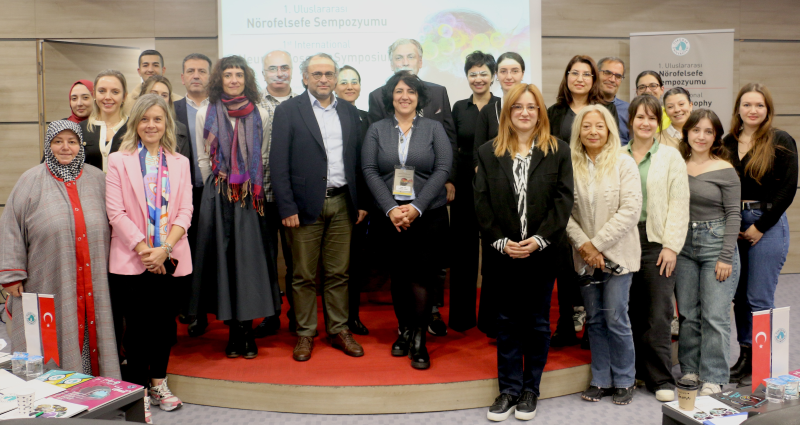
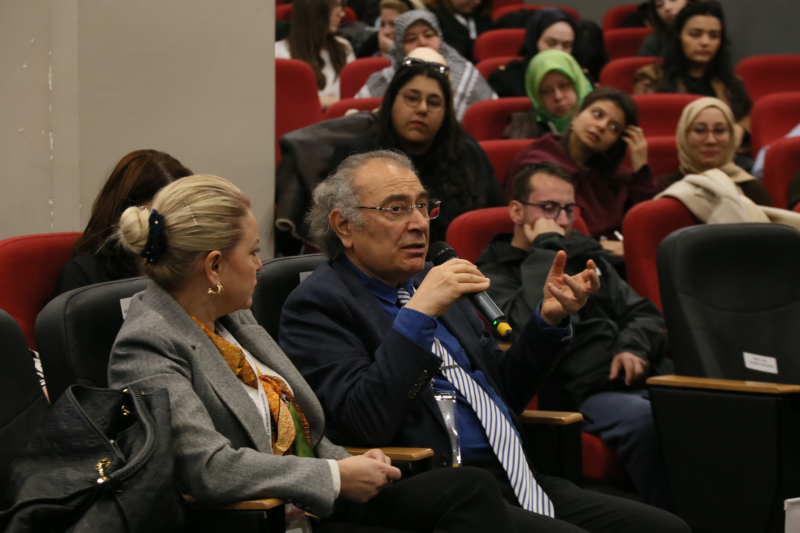
The '1st International Neurophilosophy Symposium' held at the Üsküdar University South Campus Fuat Sezgin Conference Hall was held with the participation of important names in the field.
The opening speeches of the symposium, which was broadcast live on ÜÜ TV and Üsküdar University YOUTUBE account, were made by Üsküdar University Philosophy Department Head Prof. Dr. Çiğdem Yazıcı, Dean Prof. Dr. Deniz Ülke Kaynak, Üsküdar University Rector Prof. Dr. Nazife Güngör and Üsküdar University Founding Rector and Chairman of the Board of Directors Prof. Dr. Nevzat Tarhan.
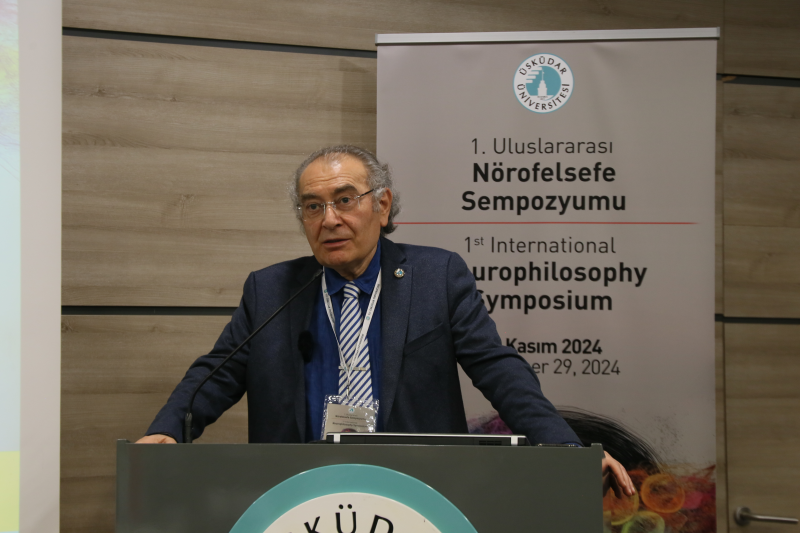
Prof. Dr. Nevzat Tarhan, who said that some innovations in this life are related to good goals, results and brave decisions taken on time, said, “There is now enough scientific justification to organize the first symposium on neurophilosophy in Türkiye. That is why we decided to do this. I would like to thank all the professors in the philosophy department who believed in this issue and supported it, especially Professor Çiğdem, Professor Sultan and the organizing committee.”
Reminding us of the physicists and cognitive psychologists who won the Nobel Prize in Physics for their work on 'basic discoveries and inventions that make machine learning possible with artificial neural networks', Tarhan said, "There is a need for a bridge between mental processes and the functioning of the brain. How do we make decisions? How do we make moral decisions? What is free will? What is consciousness? All of these are mental processes. And this mentalization, mental processes are only present in humans among primates. Severely autistic individuals cannot mentalize, cannot produce theory of mind. Not being able to produce theory of mind is a function of the brain."
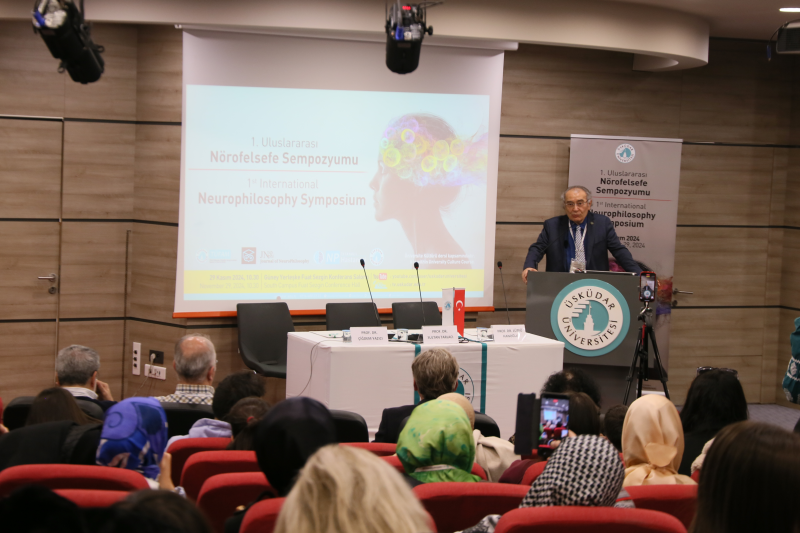
Emphasizing that neurophilosophy is a new field, Prof. Dr. Nevzat Tarhan said that much new information will emerge in this field and continued his words as follows:
“Artificial intelligence that imitates the human brain is currently at a serious level. Just as electricity changed human life, artificial intelligence will make that change. This is inevitable. Here, the new universe, the new space of science is the brain. We must definitely reveal and find the causal relationship between the brain and philosophy. Is the mind a quantum field? What is consciousness? This is one of the discussion topics. After a person is born, the skin cells in the body change in 20 days, and in 6 months, inorganic substances in the entire body are replaced by other inorganic substances. The cells remain, but fundamental things change. But consciousness does not change. How can a conscious person emerge from inanimate atoms? Is the human mind an interface between the brain and the soul? When I think about all this, I think that physicists will most likely join the neurophilosophy discussions. If learning new things excites a person, something new will come out of there. Today, I see a team here that is excited and enjoys learning new things and is trying to present this to the scientific flow. We are holding the first neurophilosophy symposium, I hope we will repeat it next year and compile the presentations into a book.”
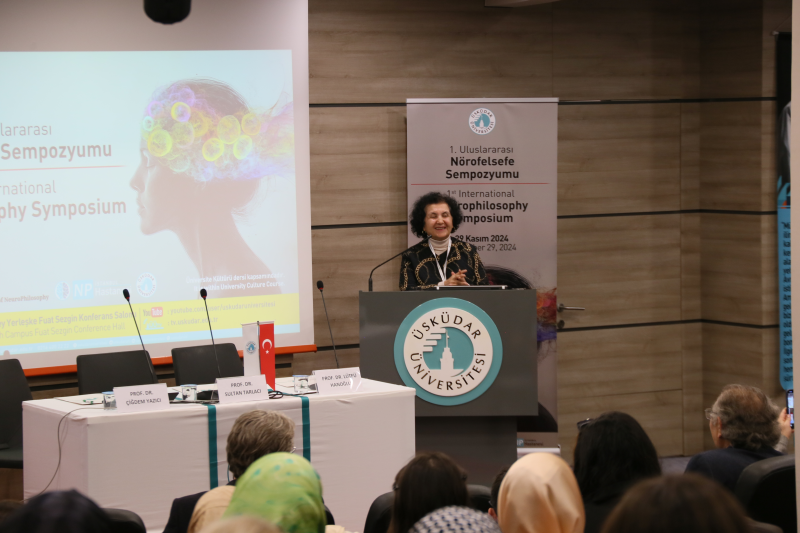
Prof. Dr. Nazife Güngör, who touched upon the concept of 'neuro' in her opening speech, said, "We need to think about whether the concept of neuro is the magic word of recent years. "Neuro-" has become an important scientific and intellectual paradigm of recent years." Güngör, who stated that it is not a coincidence to put 'neuro' at the beginning of every kind of movement and scientific and intellectual activity, continued as follows:
“This is not a fashion, a trend, this is a fact. This is actually the point that thought and science have reached. As a result, it has been reached and the focus has begun on the human brain. Because there are many things that have not been discovered. The depths of the brain, all its areas have not yet been entered. Thought and science came together there and concentrated there. Today, artificial intelligence technology has also focused on the brain. Thanks to this, all scientific disciplines have begun to recombine, to come together again. We are also experiencing a period of reintegration, of entering into an interdisciplinary process again.”
Güngör: “Humanity has brought together all the data it has”Reminding that separation emerged with modernization, Güngör said, “At the point we have reached now, science and thought are moving towards a regrouping, a re-integration, an interdisciplinary process, with the neuron also being placed at the center. All sciences are now feeding off each other. We have all started to feed off this pool.” Emphasizing that great care should be taken in the introduction of this new paradigm into the life of thought and science, Güngör said, “Humanity has brought together all the data it has, both science and scientific disciplines. It seems to me that it will try to understand and make sense of itself, the world, and the universe as a whole, with all the materials and possibilities it has. Therefore, these will be discussed in this symposium.”
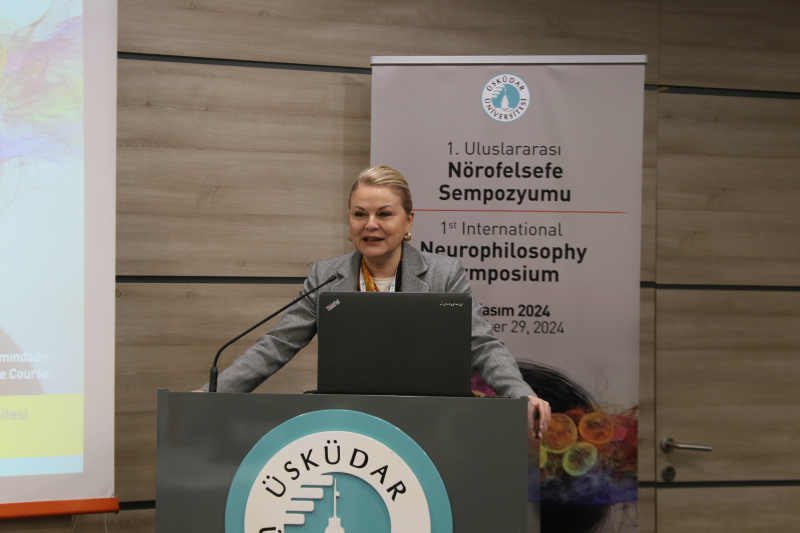
Prof. Dr. Deniz Ülke Kaynak expressed in her speech that she was very happy to organize such a symposium as the Faculty of Humanities and Social Sciences.
“As a university, we are an institution under the leadership of our Prof. Nevzat Tarhan; we like to do new things, we like to be talked about,” said Kaynak, “We bring out issues that are thousands of years old, sometimes stuck in the treasure chest, and discuss them. Sometimes we discuss brand new issues, issues that no one has discussed before. But our most important feature while doing these is that we discuss them together. In other words, we try to create an interdisciplinary, interdisciplinary meeting.”
Kaynak stated that the logic of science is also this working model and said:
“At the starting point of science, in Aristotle and Pythagoras, the sciences start together and continue together, then they separate. They start to develop differently from each other. But in today’s world, we are actually experiencing the real Renaissance again, the rebirth; we are starting to develop new areas where interdisciplinarity comes to the fore, nothing is understandable on its own, spirituality and materialism can coexist at the same time. Neurophilosophy will be talked about a lot, and we will start to get to know it. And it is an area where neither what is said is properly understood nor what is said is said completely and perfectly. In other words, this is something that will grow on its own, and will grow as human beings learn. Who knows what new things we have learned about neuro. By bringing psychology and politics together, we have produced a lot of things in the context of political psychology. We are now developing a lot of new perspectives.”
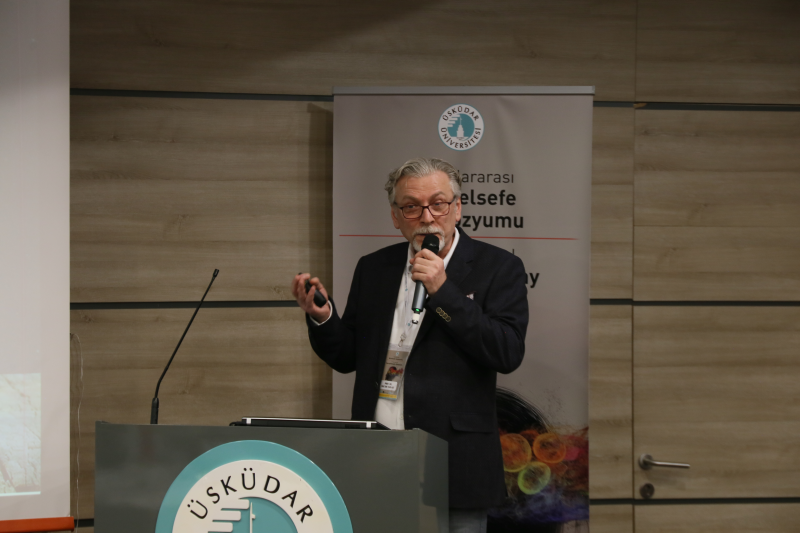
Making a presentation titled "What is Neurophilosophy? A Brief Introduction" within the scope of the symposium, Faculty of Medicine Neurology and Neuroscience Department Faculty Member Prof. Dr. Sultan Tarlacı said, "We see a title, an area of interest called 'philosophy of mind' in a time period that we have been searching for almost since ancient times."
Sharing the information that almost all philosophers have touched upon this subject or have written extensively, Tarlacı said, “One of the subjects that philosophers have dealt with the most was, within the philosophy of mind, free will, goodness, evil, responsibility for crime, ethics in relation to free will, philosophy of morality and philosophy, philosophy of aesthetics and beauty, philosophy of language, philosophy of logic, theology and philosophy of faith, philosophy of time and space. The soul-body discussions, which have been one of the important subjects of philosophy since ancient times, have transformed into discussions of mind, consciousness and brain today, but have been the focus of philosophers of mind for many years. How will philosophy overcome these unsolved ancient problems that have been going on for 2,500 years? Will we be able to go beyond the sky? Will we be able to see heaven as knowledge, will we be able to reach it? This is an unsolvable question. Topics such as soul-body, consciousness-brain-mind discussions, free will are also included in this question.”
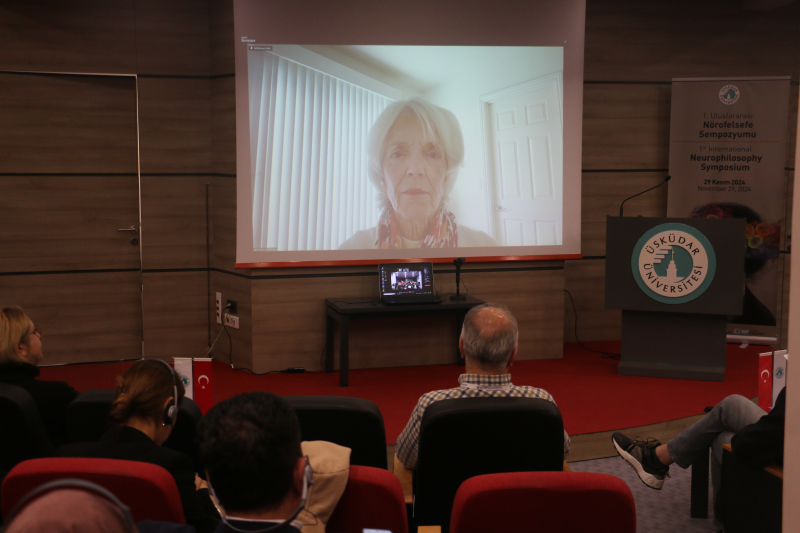
The global authority on neurophilosophy, the symposium's keynote speaker, Prof. Dr. Patricia Churcland, gave a presentation titled "The Origins and New Directions of Neurophilosophy". Churcland addressed the issue of morality and philosophy.
Drawing attention to what philosophy says about morality, Churchland stated that American biologist Edward Wilson said, 'the evolution of human sociality is the fundamental impasse of biology' and that he tried to understand why humans are social beings.
Prof. Dr. Patricia Churchland also explained the evolution of moral philosophy until the 2000s…Churchland said, “In his book published in 1871, Darwin says that people’s moral understanding focuses on 3 things, one of which is social instincts. We are born with the instinct to be social. We develop problem-solving mechanisms by developing certain behaviors and skills. Darwin also explains that social behaviors are seen in many mammal species. We observe that social skills are also present in animals. For many years, philosophy accepted that only humans exhibited such behaviors. However, the sociality of each species is shaped in its own environment.” Churchland, who also stated that philosophers advise doing the right thing for the highest benefit, also explained the evolution of moral philosophy until the 2000s.
















